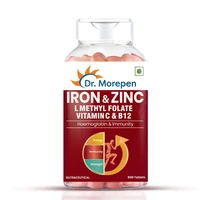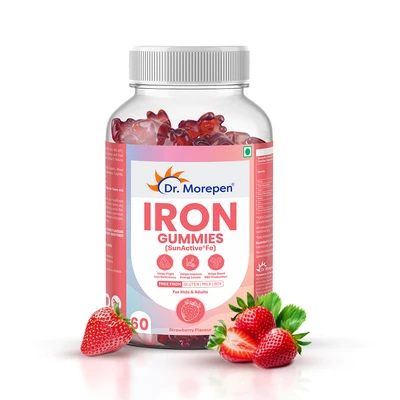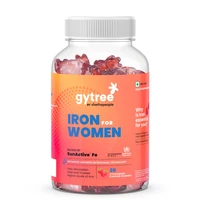Iron
Iron is required for red blood cell formation and oxygen transport in the body, its deficiency may cause fatigue, weakness, and anemia.
31% OFF

Dr. Morepen Iron & Zinc Tablets With Vitamin C & B12
₹363
MRP: ₹529
Add21% OFF

Rasayanam True Form Iron Supplement
₹549
MRP: ₹699
Add10% OFF

Dr. Morepen Iron Gummies With Sunactive® Fe
₹539
MRP: ₹599
Add14% OFF

Swisse Ultiboost Iron Supplement With Vitamin C, Vitamin B6 & Vitamin B12
₹807
MRP: ₹949
Add30% OFF

Gytree Iron For Women
₹699
MRP: ₹999
Add
What is iron?
Iron is one of the essential minerals our body needs to function properly. Although it is required in small quantities but plays a crucial role in haemoglobin synthesis, transporting oxygen to various parts of the body, and assisting our muscles in using and storing oxygen. We also need iron for physical growth, neurological development, cellular functioning, and hormone synthesis.
Dietary iron exists in two forms:
- Heme Iron: Heme iron is majorly found in animal-based iron rich foods like eggs, meat, poultry, and fish. This form has a better bioavailability and absorption rate.
- Non-heme Iron: This form is found in plant-based iron rich foods, for example, dark green leafy vegetables, lotus stem, lentils, soybean, and quinoa. The absorption of plant-based foods with iron depends on the balance between dietary enhancers, inhibitors, and body iron stores.
Iron: Benefits & Uses
Here are a few functions of iron and reasons why our diet should contain sources of iron.
- Haemoglobin synthesis: Iron is essential for blood production. Iron is found in the blood as haemoglobin, which is necessary for transferring oxygen in the blood from the lungs to the tissues.
- Boost athletic performance: Iron exists in the form of myoglobin in muscle cells, which accepts, stores, transports and releases oxygen. Inadequate iron levels can reduce the oxygen supply during workouts and overall exercise capacity.
- Energy metabolism: Iron plays a vital role in ATP synthesis, which is our primary energy source.
- Strengthen immunity: Immune cells like lymphocytes utilize iron for their growth and proliferation. Therefore, iron levels influence immunity to a significant extent.
- Improve mood: Iron influences various enzymes affecting the synthesis of neurotransmitters, including serotonin, norepinephrine, and dopamine.
- Smooth brain functioning: Healthy iron levels are a must to maintain normal physiological brain function, whereas prolonged iron deficiency can cause neurotoxicity through different mechanisms.
- Tissue growth during pregnancy: Iron is essential for synthesizing red blood cells for both mother and the developing foetus during pregnancy.
- Prevent anaemia: Iron deficiency anaemia is prevalent globally. World Health Organization (WHO) estimates that around two billion people are anaemic worldwide and attribute approximately 50% of all anaemia to iron deficiency.
Iron: Types
Iron supplements are readily available. They may vary in their form, composition and types. Here are a few types of iron supplements.
- Ferrous Sulphate: This is the most common form found in iron tablets for treating anaemia and low iron levels. It has a high absorption rate but can cause side effects like abdominal distress, constipation or diarrhoea.
- Ferrous Gluconate: This form also has a better absorption rate and is less likely to cause abdominal discomfort.
- Ferrous Fumarate: Fumarate form is common in dietary multivitamin supplements. It works best when taken on an empty stomach or 2 hours before or after meals. The absorption rate is good but may cause mild stomach upset.
How to choose the right iron for you?
Here are a few tips that may help you choose suitable iron tablets.
- Iron supplements are available in various forms, like tablets, capsules, gummies, and syrups. Choose the one as per your preference and ease of consumption.
- Iron capsules or tablets may have different types and compositions. They may differ in dosage, absorption rate and potential side effects. Consult a doctor if you are unsure which suits your body's needs.
- Iron supplements may interact with certain medications or health supplements. Read the pack instructions and recommended usage.
- People with medical conditions and pregnant and lactating women must never consume iron tablets without consulting their doctor.
How to use iron?
- One can consume iron supplements per the pack's recommended usage instructions.
- Iron supplements are best absorbed on an empty stomach. However, they may cause gastrointestinal side effects such as nausea, stomach upset, and constipation, so taking them with food may help prevent these symptoms.
- While taking iron supplements with food, avoiding foods and drinks that may interfere with iron absorption, such as dairy products, tea, coffee, caffeine, and calcium supplements, is advisable.
- One should avoid exceeding the recommended dosage to prevent iron toxicity.
- It is advisable not to miss or double any dose and take them regularly.
Where to buy iron?
Nutrabay.com is India's most trusted leading online website for the best iron tablets in India. Products sold on Nutrabay are 100% authentic as they are sourced either directly from the brands or official importers. We guarantee a hassle-free buying experience online with secure payment options. Check out iron supplement tablets to feel great daily and build a healthy body.
Is iron safe to use?
Iron tablets are generally safe to use for people with low iron levels. However, it is advisable to consult an expert before taking iron tablets. Some people may experience indigestion issues like constipation, diarrhoea, or nausea while taking iron supplements.
One must avoid taking iron in excess as it can lead to iron overload and damage to organs such as the liver and heart.
Frequently Asked Questions (FAQs)
1. What are the causes of iron deficiency anemia?
Here are a few iron deficiency causes -
- Inadequate dietary iron intake
- Blood loss during menstruation, injury or surgery
- Medical conditions like IBS or celiac disease affecting iron absorption
- Medications
- Intake of iron rich foods with caffeine or calcium that reduce iron absorption
2. What are the symptoms of iron deficiency?
Here are a few iron deficiency symptoms -
- Low energy levels
- Fatigue
- Pale skin
- Headache
- Brittle nails
- Shortness of breath
- Dizziness
- Restless leg syndrome
3. Are there any iron rich fruits?
- Berries
- Dates
- Prunes
- Figs
- Apricots
- Peaches
4. What are the common sources of iron?
- Eggs
- Meat
- Seafood
- Chicken
- Dark green leafy vegetables
- Beans
- Tofu
- Lentils
- Raisins
- Bran cereals
- Fortified foods
5. What are the benefits of iron tablets for women?
Iron tablets can help women in the following ways -
- Prevent iron deficiency anemia
- Enhance energy levels
- Boost brain health
- Support healthy pregnancy
- Amplify exercise performance
6. List some iron rich vegetables.
- Mustard leaves
- Bathua leaves
- Broccoli
- Kale
- Collard greens
- Beans
- Green peas
- Lotus stem
7. Are there any side effects of iron tablets?
When taken in high doses for a longer duration, iron tablets can cause side effects like stomach pain, diarrhoea, constipation, nausea, headache, teeth darkening, etc.
8. What is the iron deficiency treatment?
- Increase intake of iron rich foods
- Try iron supplements
- Avoid taking caffeine and calcium-rich foods with iron foods or supplements
- Prefer taking iron foods with vitamin C foods
9. What is our daily iron requirement?
As per ICMR, the daily iron requirement for adult males is 19 mg and 29 mg for females.
10. How to boost iron absorption?
One can increase iron absorption by combining iron rich foods or supplements with foods rich in vitamin C, like citrus fruits, amla, guava or bell peppers. Vitamin C has been shown to increase iron absorption.
- Dr. Morepen Iron & Zinc Tablets with Vitamin C & B12₹363
- Rasayanam True Form Iron Supplement₹549
- Dr. Morepen Iron Gummies With Sunactive® Fe₹539
- Swisse Ultiboost Iron Supplement with Vitamin C, Vitamin B6 & Vitamin B12₹807
- Gytree Iron for Women₹699




